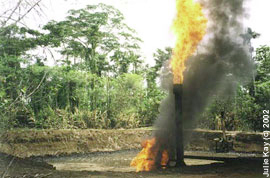Energy Giants Sued for Third World Woes

Part One
Energy Giants Sued for Third World Woes
Indonesia conflict one of many turning up in court
by Jennifer Huang,newsdesk.org
In March 2001, citing safety concerns, ExxonMobil suspended operations at the Arun natural gas fields in Aceh in North Sumatra -- an Indonesian province torn by separatist violence.
The closure lasted four months, and added up to a loss of $350 million. Production resumed that June after Indonesia increased security forces in the region.
But ExxonMobil's acceptance of government security measures has provoked a lawsuit, filed against the company by anonymous Acehnese villagers.
The suit alleges that, over the last 11 years, the company provided salaries and equipment to military forces responsible for human rights abuses in Aceh (pronounced "Ah-chay"), including sexual assault, kidnapping, murder and genocide.
The accusations raise questions of accountability and realpolitik -- and while the situation in Aceh is hardly clear-cut, its complexities unfold in the story of Jafar Siddiq Hamzah.
In 1971, when Hamzah was six, Mobil Oil Indonesia discovered nearly 14 trillion cubic feet of natural gas in Aceh, much of it near his hometown of Lhokseumawe.
That same year his father was arrested and detained by the Indonesian government for refusing to join General Suharto's ruling party, Golkar. According to Hamzah's sister Cut (pronounced "Chyoot") Zahara, their father, as a state-employed teacher, was required to enlist.
Hamzah's father capitulated after five and a half years, and was reunited with his family as a party member. Around the same time, in 1976, Mobil Oil Indonesia joined with the state petroleum corporation Pertamina and Japanese-Indonesia LNG, forming the PT Arun company to extract, liquefy and export Aceh's natural gas.
It was also the year the separatist Free Aceh Movement (Gerakan Aceh Merdeka, or GAM) began attacking Indonesian military forces, including those stationed to protect PT Arun facilities, and the facilities themselves.
According to William Liddle, a professor of political science at Ohio State University, the gas extraction and processing plants were potent symbolic targets for insurgents who saw regional wealth flowing to Jakarta.
"Mobil was a huge foreign exchange earner for the central government. So this is their World Trade Center, in a way. This really gets their attention," he said.
Indeed, the violence brought the attention of the Indonesian military, which has responded with the sort of brutality that brought it notoriety in East Timor. Since 1976 approximately 2,000 Acehnese have been confirmed killed in ongoing separatist violence and military sweeps. Activists say that many more are buried in mass graves, perhaps up to 39,000.
Now, human rights lawyers and Acehnese villagers are using the U.S. court system to address the cycle of violence, by attempting to link ExxonMobil operations with the Indonesian military.
Their lawsuit against ExxonMobil (the two companies merged in 1999) is hardly unique: ChevronTexaco, Royal Dutch Shell and Unocal are the subject of similar actions, alleging the corporations' complicity with repressive, undemocratic governments in Nigeria, Ecuador and Myanmar (Burma).
"The civil liability suits are part of an emerging environment in which businesses take an expansive view of their bottom line," said Ralph Steinhardt, a professor of international law at George Washington University. "It's no longer a free ride for companies to go into other countries and expect profit though a pattern of human rights violations."
Next: A Life in Aceh
Get Involved
If you'd like to help with maintaining or developing the website, contact us.
Publish
Publish your stories and upcoming events on Indybay.


